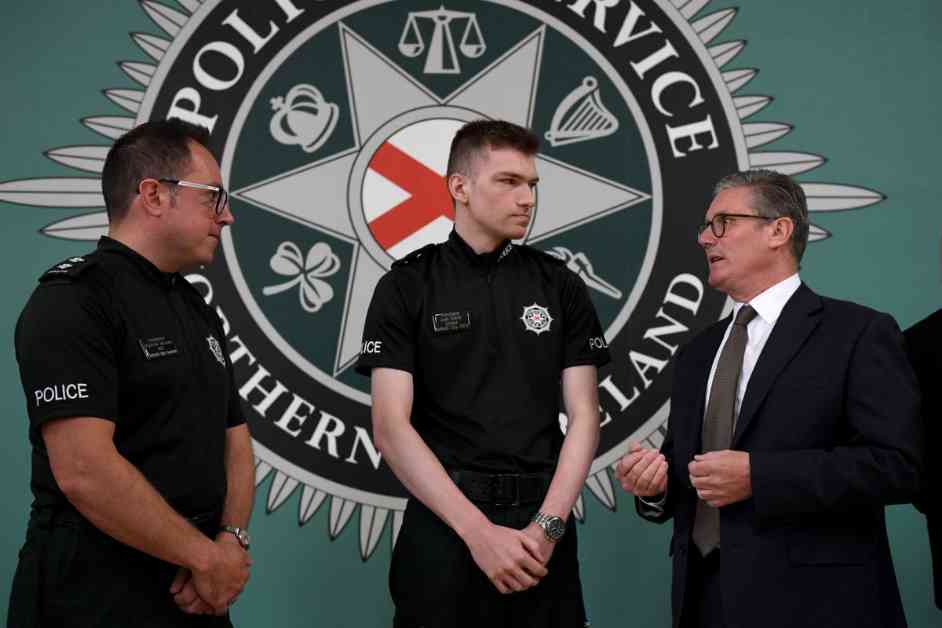Prime Minister Sir Keir Starmer made a visit to Belfast on Monday to personally thank police officers who were injured during recent disorder, emphasizing the importance of community relations in the aftermath of the violence. During his visit, Prime Minister Starmer met with representatives from minority ethnic communities who had been targeted in the violence, including the destruction of businesses and an attack on a mosque.
Violent incidents in early August in Northern Ireland resulted in at least 20 police officers being injured after anti-immigration protests escalated into unrest. Bricks, petrol bombs, and other projectiles were hurled at officers during the protests, particularly in areas such as Londonderry. The Police Service of Northern Ireland Chief Constable Jon Boutcher expressed concern for the injured officers, noting that some would require surgery due to the severity of their injuries.
With police numbers in Northern Ireland falling below the recommended strength, approximately 80 officers from Police Scotland were deployed to support the PSNI in maintaining order. Chief Constable Boutcher commended the Scottish officers for their assistance, stating that they had seamlessly integrated with the local force and understood the importance of their role in restoring peace.
During his visit, Prime Minister Starmer took the time to meet with injured police officers, including Constable Josh Elliott, to express his gratitude for their service and resilience in the face of danger. He commended the community for rallying around each other during the turbulent times, emphasizing the unity and strength of Northern Ireland in times of adversity.
Supporting the Minority Ethnic Community
In addition to meeting with injured police officers, Prime Minister Starmer also engaged with leaders from various organizations representing the minority ethnic community in Northern Ireland. One such leader was Nisha Tandon, the founder and director of ArtsEkta, an organization that promotes diversity and cultural exchange through events like the Belfast Mela festival.
Tandon described the meeting with the Prime Minister as positive and welcomed the opportunity to discuss the challenges faced by minority ethnic communities in the wake of the violence. She noted that the engagement with Prime Minister Starmer was more meaningful than interactions with other political leaders, as he appeared genuinely interested in listening to their concerns and perspectives.
Prime Minister Starmer reiterated the importance of engaging with communities most impacted by the disorder, acknowledging the fear and anxiety experienced by minority ethnic groups in the aftermath of the violence. He emphasized the need to address and condemn the racist nature of the attacks, reaffirming his commitment to building a forward-looking and inclusive Northern Ireland.
Gratitude and Reflection
At the conclusion of his visit, Prime Minister Starmer reflected on the purpose of his trip to Belfast, highlighting the significance of expressing gratitude to frontline police officers and engaging with communities affected by the violence. He emphasized the bravery and dedication of police officers who had faced danger to uphold public safety, stressing the importance of acknowledging their sacrifices.
In addressing the disorder and attacks on police officers, Prime Minister Starmer condemned the violence as intolerable and unjustifiable, emphasizing that such actions did not reflect the values of a modern and progressive Northern Ireland. He reiterated the need to stand against racism and discrimination, affirming his support for building a more inclusive and tolerant society in the region.
The visit by Prime Minister Starmer coincided with the release of images by the PSNI of individuals wanted for questioning in connection with the disorder and attacks on police officers. The ongoing investigation served as a reminder of the need for accountability and justice in addressing the root causes of the violence and ensuring that those responsible were held accountable for their actions.
As Northern Ireland continues to grapple with the aftermath of the recent unrest, Prime Minister Starmer’s visit served as a reminder of the importance of unity, resilience, and community engagement in overcoming challenges and building a brighter future for all residents. By acknowledging the contributions of frontline police officers and listening to the concerns of minority ethnic communities, Prime Minister Starmer demonstrated his commitment to fostering positive relationships and promoting inclusivity in Northern Ireland.












